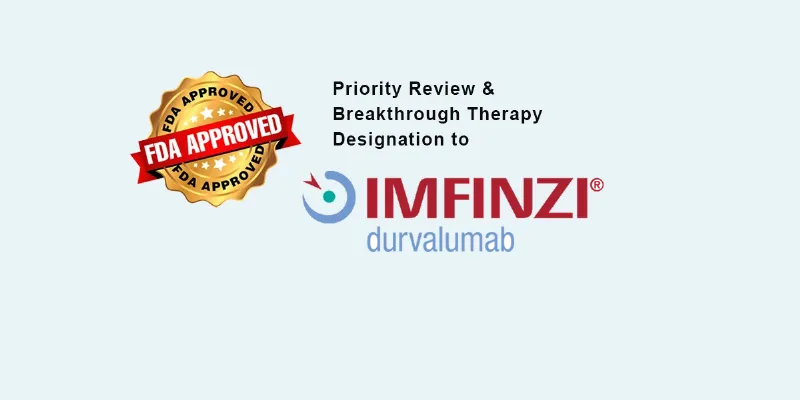Imfinzi Receives FDA Priority Review as First Immunotherapy for Gastric and GEJ Cancers

The FDA granted Priority Review and Breakthrough Therapy Designation to durvalumab (Imfinzi) for resectable gastric and GEJ cancers, based on Phase III MATTERHORN trial results. Imfinzi reduced the risk of progression, recurrence, or death by 29%. The 24-month event-free survival rate reached 67.4% vs. 58.5% with chemotherapy, marking a potential new perioperative standard.
In a potential paradigm shift for the treatment of early-stage gastric and gastroesophageal junction (GEJ) cancers, the U.S. Food and Drug Administration (FDA) has granted both Priority Review and Breakthrough Therapy Designation to AstraZeneca’s checkpoint inhibitor durvalumab. The decision follows compelling results from the Phase III MATTERHORN trial, positioning Imfinzi as the first immunotherapy-based perioperative regimen for this high-risk patient population.
If approved, Imfinzi would mark a significant advance in the management of resectable Stage II to IVA gastric and GEJ cancers—diseases marked by frequent recurrence and limited long-term survival despite current standards of care.
Meeting a High Unmet Need
“This Priority Review reinforces the potential for a perioperative approach with Imfinzi to transform care for patients with early gastric and GEJ cancers, who frequently face disease recurrence or progression even after curative-intent surgery and perioperative chemotherapy,” said Susan Galbraith, Executive Vice President of Oncology R&D at AstraZeneca. “This novel treatment is the only immunotherapy-based regimen to show a statistically significant reduction in the risk of progression, recurrence or death in this setting, and if approved, is poised to change the clinical paradigm."
Significant Survival Benefit in MATTERHORN
The MATTERHORN trial evaluated a perioperative strategy combining Imfinzi with FLOT chemotherapy (fluorouracil, leucovorin, oxaliplatin, and docetaxel) both before and after surgery. A total of 948 patients were randomized across 20 countries. In an interim analysis, the Imfinzi-based arm showed a 29% reduction in the risk of disease progression, recurrence, or death compared with chemotherapy alone (HR 0.71; 95% CI 0.58–0.86; p<0.001). While median event-free survival (EFS) had not yet been reached in the Imfinzi group, the control arm reached a median of 32.8 months.
Importantly, the 24-month EFS rate was 67.4% with Imfinzi versus 58.5% with chemotherapy alone—suggesting a deepening benefit over time. Although overall survival (OS) data are not yet mature, an encouraging trend was observed (HR 0.78; 95% CI 0.62–0.97; p=0.025), and the trial will continue to assess OS as a key secondary endpoint.
Currently, no immunotherapy regimen is approved for the perioperative setting in these tumor types. Standard care relies on neoadjuvant and adjuvant chemotherapy, yet roughly one in four patients relapse within a year post-surgery. Five-year survival remains below 50%.
Safety and Surgical Outcomes
Safety results from the trial were consistent with the known profiles of Imfinzi and FLOT. The incidence of grade ≥3 adverse events was comparable across both treatment arms, and the percentage of patients proceeding to surgery was similar—supporting the feasibility of integrating immunotherapy into standard multimodal care.
A Global Development Effort
Regulatory submissions based on the MATTERHORN data are currently under review in the EU, Japan, and other countries. With incidence rates of gastric cancer rising in patients under 50 and increasing global disease burden—nearly one million new cases in 2022—these data could help define a new standard for early intervention in a historically hard-to-treat malignancy.
The MATTERHORN trial was conducted across 176 centers worldwide and remains ongoing to confirm long-term outcomes. If Imfinzi is approved, it could become the backbone of a new immuno-oncology strategy in resectable gastric and GEJ cancers—one that addresses both local and systemic disease risk through an integrated perioperative approach.
About Imfinzi, (durvalumab)
Imfinzi (durvalumab) is a PD-L1–blocking monoclonal antibody that restores anti-tumor immune responses. Approved for various cancers, it’s used with chemotherapy in biliary tract cancer and with Imjudo in unresectable hepatocellular carcinoma. It’s a global standard in unresectable Stage III NSCLC post-CRT and approved perioperatively in resectable NSCLC and muscle-invasive bladder cancer. In endometrial cancer, Imfinzi is approved in multiple combinations based on mismatch repair status. Over 414,000 patients have received Imfinzi since its 2017 approval. Ongoing trials explore its use alone and with other therapies in NSCLC, bladder, breast, ovarian, and GI cancers, including a recent positive readout in non-muscle-invasive bladder cancer from the POTOMAC Phase III trial.











Comments
No Comments Yet!